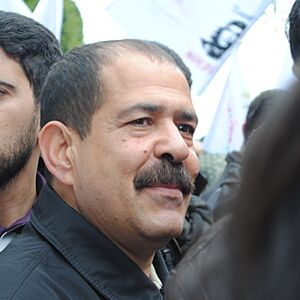Chokri Belaid facts for kids
Quick facts for kids
Chokri Belaïd
|
|
|---|---|
| شكري بلعيد | |

Chokri Belaïd in 2012
|
|
| Born | 26 November 1964 Djebel Jelloud, Tunis Governorate, Tunisia
|
| Died | 6 February 2013 (aged 48) El Menzah, Tunis Governorate, Tunisia
|
| Cause of death | Assassination (multiple gunshots) |
| Resting place | Al Jallez |
| Nationality | Tunisian |
| Political party | Democratic Patriots' Movement |
| Spouse(s) | Basma Khalfaoui |
Chokri Belaïd (Arabic: شكري بلعيد, romanized: Shukrī Bil‘īd; 26 November 1964 – 6 February 2013) was an important Tunisian politician and lawyer. He was a leader of the opposition, working with a left-wing group called the Democratic Patriots' Movement.
Belaïd was known for speaking out against the government of Zine El Abidine Ben Ali before the 2011 Tunisian revolution. After the revolution, he continued to criticize the new government, which was led by an Islamist party. On 6 February 2013, he was sadly killed outside his home in El Menzah, near the capital city of Tunis. His death led to big changes in Tunisia's government.
Contents
Early Life and Career
Chokri Belaïd was born in Djebel Jelloud, Tunisia, on 26 November 1964. When he was a student in the 1980s, he was very active in political movements.
Later, he became a lawyer. He even helped defend former Iraqi president Saddam Hussein during his trial. Belaïd was also a poet. One of his poems was written for Husayn Muruwwa, a Lebanese thinker who was killed.
Belaïd was a strong critic of Zine El Abidine Ben Ali, who ruled Tunisia for 23 years. Ben Ali's departure in 2011 was a key moment in the Arab Spring uprisings. Belaïd was married and had two daughters.
Political Views
Belaïd was a main leader of the Democratic Patriots' Movement, a left-wing political party. This party was part of a larger group of 12 organizations called the Popular Front.
He believed in pan-Arabism, which is the idea of unity among Arab nations. He was also strongly against having normal relations with Israel. Belaïd often spoke out against supporters of strict religious views, sometimes called Salafists. He blamed them for stopping plays and concerts in Tunisian cities. They were also accused of attacking the US Embassy in Tunisia in 2012.
After his death, Ziad Lakhdhar took over as the leader of the Democratic Patriots' Movement.
Assassination
On 6 February 2013, Chokri Belaïd was leaving his house in Tunis. He was shot and seriously injured by a person named Kamel Gaghgadhi. The attacker then escaped on a motorbike with another person. Belaïd was rushed to a clinic but sadly died there.
Reports said that Belaïd had received many threats to his life before he was killed. The night before his death, he said that anyone who opposed the Ennahda Movement (the ruling party at the time) became a target of violence.
After the news of his death, thousands of people protested in front of the Interior Ministry in Tunis. Police used tear gas to control the crowds. Protests also happened in other cities like Mezzouna, Gafsa, and Sidi Bouzid. Tunisia's interim president, Moncef Marzouki, cut short his trip to Cairo because of the protests and the assassination.
Investigation and Justice
On 26 February, four radical Islamists were arrested because they were thought to be connected to Belaïd's murder. The main suspect was identified as Boubacar Hakim.
Years later, on 27 March 2024, a Tunisian court made a decision in the case. Four suspects were sentenced to death for their part in the murder. Two others received life imprisonment. Five suspects were found not guilty, and the rest received different prison sentences.
Reactions to the Assassination
The killing of Chokri Belaïd caused a lot of shock and anger.
- Prime Minister Hamadi Jebali called it "a political assassination." He announced plans to form a new temporary government made up of experts.
- The Ennahda Movement, the ruling Islamist party, called the attack a "terrible crime." However, some of their offices in cities like Mezzouna and El Kef were set on fire by protesters.
- Four opposition parties, including Belaïd's Popular Front, decided to leave the national assembly. They also called for a country-wide strike.
Many countries around the world also reacted:
- Egypt – The ruling Muslim Brotherhood said that assassinations were wrong.
- Germany – The Foreign Minister, Guido Westerwelle, said he was "horrified" and "sad."
- France – President François Hollande said that Belaïd's death took away "one of Tunisia's most courageous voices."
- United Kingdom – The Foreign Office called the killing a "cowardly act" meant to make Tunisia's move to democracy unstable.
- United States – The State Department spokesperson, Victoria Nuland, condemned the killing. She asked for a fair and open investigation to find those responsible.
The assassination also led to many discussions among Tunisian thinkers and writers.
Funeral Service
Chokri Belaïd's funeral was held in Tunis on 8 February. It was attended by a very large crowd, estimated to be at least a million people. There were some clashes between police and protesters during the funeral. His body was buried at Jellaz Cemetery.
See also
 In Spanish: Chokri Belaid para niños
In Spanish: Chokri Belaid para niños
- Mohamed Brahmi
- Nahed Hattar
 | William Lucy |
 | Charles Hayes |
 | Cleveland Robinson |

